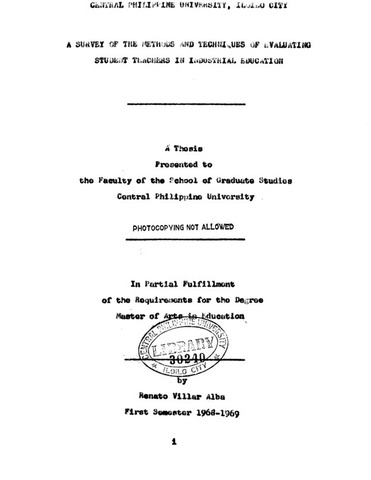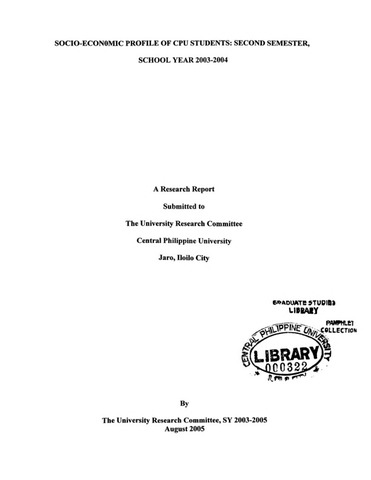A survey of the methods and techniques of evaluating student teachers in industrial education

Page views
771Date
1968Author
Thesis Adviser
Defense Panel Chair
Defense Panel Member
Share
Metadata
Show full item record
Abstract
This study attempts to identify the effective practices, methods, and techniques of evaluating student teachers in industrial education at the Iloilo School of Arts and Trades, Iloilo City. The normative-survey method was used in this study, applying observations, interviews, and questionnaires for gathering data. Seventy student teachers, eighty cooperating teachers, and eighteen supervisors in twenty cooperating schools in the Western Visayas and the Iloilo School of Arts and Trades responded to the questionnaires used in this study.
The chi-square values were computed to determine the divergences of the observed frequencies from the hypothesis of normal distributions The hypothesis of normal distribution was defined as follows:
Poor 7 per cent
Fair 24 per cent
Good 38 per cent
Very good 24 per cent
Excellent 7 per cent
The 5 per cent level of significance was not at the start of the study for accepting or rejecting the hypothesis. The data were further statistically treated to find out the methods and techniques considered effective by the respondents, using the test known as the "significance of the difference between uncorrelated percentages."
On the basis of the findings of this study, the following conclusions were drawn:
1. The Interviews conducted with the student teachers revealed that fourteen methods and techniques wore being used by the supervisors and cooperating teachers in evaluating the performance of student teachers.
2. The combined opinions of the respondents which were statistically treated revealed that ton methods and techniques are very good-excellent in evaluating the growth and progress of the student teachers. The methods and techniques are: (1) Seminar, (2) Conference, (3) Interview, (4) activity Checklist, (5) Rating Scale, (6) Supervisory visit and Observation, (7) Teaching Log, (8) Anecdotal Written Report, (9) Self-Evaluation, and (10) Written Test.
3. The student teachers reported that 100 per cent of their cooperating touchers wore using at least five methods and techniques in evaluating their experiences. These are: (1) Conference, (2) Interviews, (3) Rating Scale, (4) Teaching Log, and (5) activity checklist.
4. The policy of the Iloilo School of Arts and Trades in evaluating the student toucher is a three-way process among the cooperating teachers, the supervisor of the section or head of the vocational department, and the coordinator (the supervisor of student teaching).
5. On the basis of the number of questionnaires returned, 100 cent, it is evident that the cooperating teachers were interested in identifying and clarifying the methods and techniques.
The following recommendations are offered:
1. The methods and techniques considered very good-excellent by the respondents ought to be used in evaluating the program of student teaching and student touchers. The methode and techniques are: (1) Seminar, (2) Conference, (3) interview, (4) Activity Checklist, (5) Rating scale, (6) Teaching Log, (7) Supervisory Visit and Observation, (8) Anecdotal written Report, (9) Self-Evaluation, and (10) Written Test.
2. The followinq methods and techniques are specifically recommended for by the cooperating teachers in evaluating the performance of student teachers: (1) Conference, (2) Interview, (3) Activity Checklist, (4) Rating scale, (5) Self-Evaluation, and (6) Written Test.
3. There should bo a continuous appraisal of the methods and techniques in evaluating student teachers as done in this study.
4. There should be a conference of all the student teachers and cooperating teachers in the section or department in the case of vocational schools, at least once every two weeks.
5. Cooperating teachers should be invited to attend the seminar on problems met by the student teachers during their practice teaching at least twice a semester.
6. A similar study should be conducted in private schools with a teacher education program using the same methods and techniques in evaluating student touchers.
Description
Abstract only
Suggested Citation
Alba, R. V. (1968). A survey of the methods and techniques of evaluating student teachers in industrial education (Unpublished Master’s thesis). Central Philippine University, Jaro, Iloilo City.
Type
ThesisSubject(s)
Keywords
Department
School of Graduate StudiesDegree
Master of Arts in EducationShelf Location
GSL Theses 378.242 Al13
Physical Description
184 leaves
Collections
Related items
Showing items related by title, author, creator and subject.
-
Socio-economic profile of CPU students: Second semester, school year 2003-2004
University Research Committee (Central Philippine University, 2005-08)This survey was conducted in order to determine the profile of the students of Central Philippine University for the second semester of SY 2003-2004. This study was descriptive in nature and employed the survey approach. ... -
Assessing the guidance and counseling needs of students with special needs in higher education institutions
Imbang, Lei Marie F. (2012)The increase in number of students with special needs in higher education institutions necessitates greater understanding of their needs. The purpose of this study was to determine the guidance and counseling needs of ... -
Central Philippine University electronic class record
Alamo, Merryl Lou J.; Francisco, Peterson S.; Del Campo, Lorenz C.; Dela Cruz, Robert Jan B.; Oroceo, Xerian Lloyd F. (2014)This study was designed to develop an Electronic Class Record for Central Philippine University. It focused on the following objectives: provide a synching module that allows the faculty to retrieve and constantly update ...




